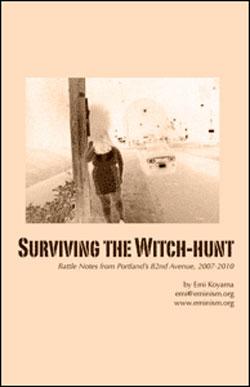Surviving the Witch-Hunt: Battle Notes from Portland’s 82nd Avenue, 2007-2010

Surviving the Witch-Hunt is collection of artifacts and commentary from 2007 to the present and catalogues the community forces that emerged after the City of Portland removed its controversial Prostitution Free Zones (PFZ). These zones had allowed the police to issue exclusion orders for those who had been arrested for sex work, even if they had never been charged. For ninety days, anyone arrested for prostitution in the designated area was not allowed to return without submitting an appeal, segregating public space and criminalizing behavior without actual legal indictment.
The uproar from community figures after the removal of the PFZs demonstrated the discriminatory sentiments of many of those living in the 82nd Avenue neighborhood. Those who opposed the end of the PFZs claimed that there was an increase in crime and a correlating decrease in their property value, and they united to fight the “problem” of sex work in their communities. Emi Koyama collected documents that demonstrate their anger toward sex workers and bolsters these artifacts with some social justice commentary, raising arguments that protect the rights of all women and advance a more holistic view of community development. This booklet uses the 82nd Avenue case study as an example of how multifaceted problems cannot be solved via law enforcement but through broader advances in social and economic justice.
Countering the arguments of outraged neighbors near 82nd Avenue, Koyama’s documents describe the harm PFZs do to women who work in the sex industry. The fliers in the collection address the underlying causes of sex work, and explain that improved access to housing, employment, and treatment services are a better response than criminalization. The documents also catalogue the efforts of anti-prostitution advocates who focus on educating men about the social dangers of purchasing sex. This was the most interesting part of the compilation to me, since many anti-prostitution feminists are pushing educational programs as a way to end sex work. Koyama’s work shows that decreasing the demand for sex work, while a seemingly laudable goal, actually harms women. Decreasing demand also reduces the price for services, so sex workers have to do more acts for less money, and it pushes sex work to more remote areas, causing potential dangers for workers. Also, johns who are rational regarding risk taking will be taken out of the pool, leaving a group of riskier men purchasing the services of sex workers. These men are more likely to act violently towards sex workers and are less likely to take safe precautions during sex.
As someone who recognizes that the problems associated with sex work have no simple solutions, I am thankful that Koyama lays out these rebuttals to anti-prostitution groups. Criminalizing and even reducing the amount of sex work will do little to address the more serious problems in our communities. Sadly, the deeply rooted social, racial, and gendered inequities that necessitate sex work too often go unnoticed by policymakers, concerned citizens, and others trying to improve their communities.
As a human rights lawyer, I am personally outraged at the discriminatory attitudes of too many in the 82nd Avenue community regarding the end of PFZs, and I am somewhat embarrassed that I had not known about these events before reading this collection. Many local stories of civil rights conflict, of discrimination, and of survival often don’t reach further than the affected community. By effectively curating a compilation of documents from the 82nd Avenue community, Koyama demonstrates the importance of capturing a historical moment in the trajectory towards justice. The fliers, newspaper articles, notices about community meetings, and email messages Koyama collected were probably designed to be temporary, but in this small archive they combine to tell a powerful story of the strength of community activism.